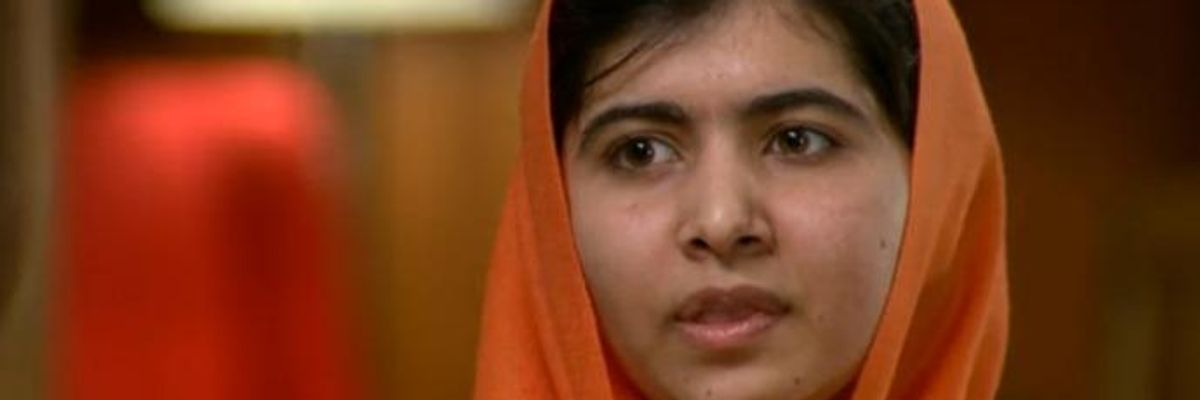On October 10, Pakistani teenager Malala Yousafzai-who received worldwide attention after being attacked by the Taliban for her advocacy for girls' education-was awarded the Nobel Peace Prize, along with Indian activist Kailash Satyarthi. Yousafzai's work on educational equity is well-known. But less well-known is what she said to Barack Obama about how his wars were undermining the fight against terrorism.
Last year, Yousafzai's White House meeting with Barack Obama received wide media coverage. But as I pointed out back then (FAIR Blog, 10/15/13), part of Yousafzai's message didn't make it into most media accounts: She told Obama that drone strikes in her country were fueling more terrorism.
After the meeting, she released a statement that included this:
I also expressed my concerns that drone attacks are fueling terrorism. Innocent victims are killed in these acts, and they lead to resentment among the Pakistani people. If we refocus efforts on education, it will make a big impact.
As Rania Khalek reported in Extra! (12/13), this part of her message wasn't suited for US television:
In the week following the meeting, ABC, NBC and CBS aired 20 Malala Yousafzai-related stories, according to a search of the Nexis news media database. But not one of them mentioned her comments about US drone strikes.
After Yousafzai's award, she was back in the headlines; the news about the Nobel Peace Prize made it onto every network newscast. But once again, her message to Obama was absent-a curious omission, given the context.
CBS This Morning was one of the few outlets that covered her drone comments the first time around, so it replayed an excerpt of an interview with Norah O'Donnell on October 10:
DONNELL: Is it true that when you spoke with President Obama, that you talked about your concern that drone attacks are fueling terrorism?
YOUSAFZAI: The first thing is that, it is true that when there's a drone attack, those-the terrorists are killed, it's true, but 500 and 5,000 more people rise against it, and more terrorism occurs, and more bomb blasts occur. So for that reason, I think the best way to fight against terrorism is do it through peaceful way, not through war, because I believe that a war can never be ended by a war.
O'DONNELL: And you said that to President Obama?
YOUSAFZAI: Yes, of course.
CBS Evening News (10/10/14) aired an excerpt from the same interview that night , but it wasn't this part.
Maybe it just takes some outlets longer to get around to talking about this. We noted last year that ABC reported Yousafzai's critique of US policy 11 weeks after her visit (FAIR Blog, 1/2/14). And in a report last week about the Nobel Prize, the New York Times (10/10/14) mentioned in the first paragraph that she "confronted President Obama about American drone policy in a meeting last year."
